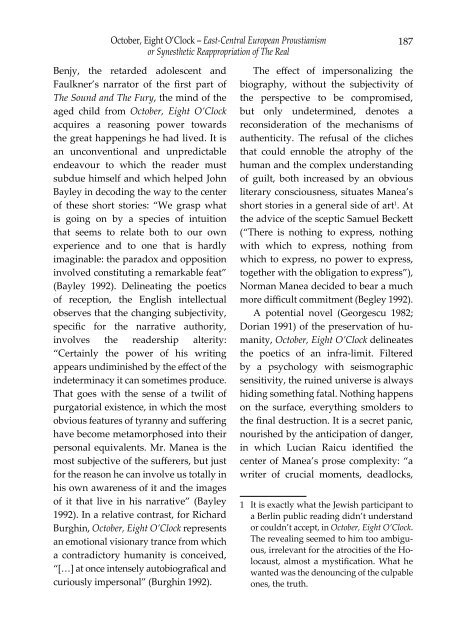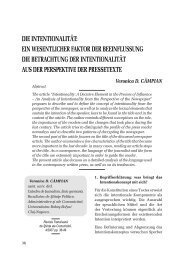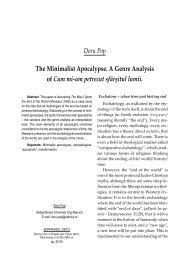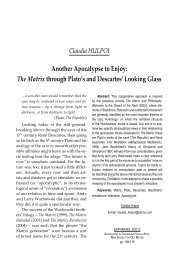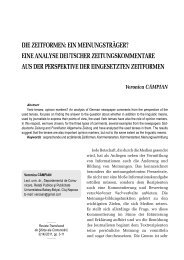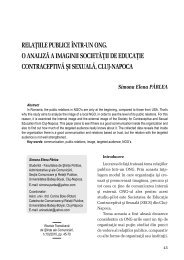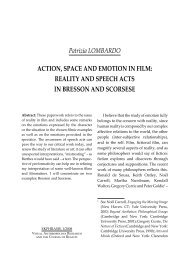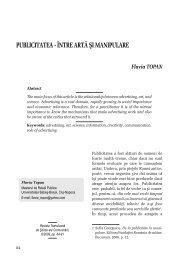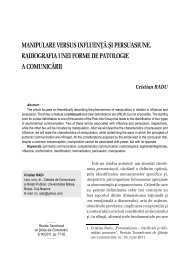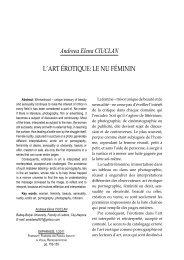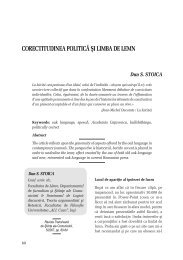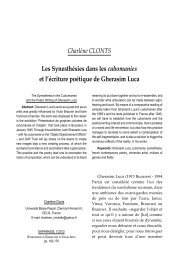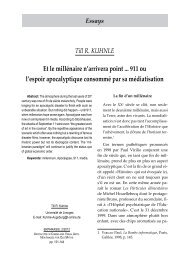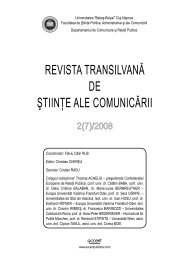East-Central European Proustianism or Synesthetic ... - Ekphrasis
East-Central European Proustianism or Synesthetic ... - Ekphrasis
East-Central European Proustianism or Synesthetic ... - Ekphrasis
Create successful ePaper yourself
Turn your PDF publications into a flip-book with our unique Google optimized e-Paper software.
October, Eight O’Clock – <strong>East</strong>-<strong>Central</strong> <strong>European</strong> <strong>Proustianism</strong><br />
<strong>or</strong> <strong>Synesthetic</strong> Reappropriation of The Real<br />
187<br />
Benjy, the retarded adolescent and<br />
Faulkner’s narrat<strong>or</strong> of the first part of<br />
The Sound and The Fury, the mind of the<br />
aged child from October, Eight O’Clock<br />
acquires a reasoning power towards<br />
the great happenings he had lived. It is<br />
an unconventional and unpredictable<br />
endeavour to which the reader must<br />
subdue himself and which helped John<br />
Bayley in decoding the way to the center<br />
of these sh<strong>or</strong>t st<strong>or</strong>ies: “We grasp what<br />
is going on by a species of intuition<br />
that seems to relate both to our own<br />
experience and to one that is hardly<br />
imaginable: the paradox and opposition<br />
involved constituting a remarkable feat”<br />
(Bayley 1992). Delineating the poetics<br />
of reception, the English intellectual<br />
observes that the changing subjectivity,<br />
specific f<strong>or</strong> the narrative auth<strong>or</strong>ity,<br />
involves the readership alterity:<br />
“Certainly the power of his writing<br />
appears undiminished by the effect of the<br />
indeterminacy it can sometimes produce.<br />
That goes with the sense of a twilit of<br />
purgat<strong>or</strong>ial existence, in which the most<br />
obvious features of tyranny and suffering<br />
have become metam<strong>or</strong>phosed into their<br />
personal equivalents. Mr. Manea is the<br />
most subjective of the sufferers, but just<br />
f<strong>or</strong> the reason he can involve us totally in<br />
his own awareness of it and the images<br />
of it that live in his narrative” (Bayley<br />
1992). In a relative contrast, f<strong>or</strong> Richard<br />
Burghin, October, Eight O’Clock represents<br />
an emotional visionary trance from which<br />
a contradict<strong>or</strong>y humanity is conceived,<br />
“[…] at once intensely autobiografical and<br />
curiously impersonal” (Burghin 1992).<br />
The effect of impersonalizing the<br />
biography, without the subjectivity of<br />
the perspective to be compromised,<br />
but only undetermined, denotes a<br />
reconsideration of the mechanisms of<br />
authenticity. The refusal of the cliches<br />
that could ennoble the atrophy of the<br />
human and the complex understanding<br />
of guilt, both increased by an obvious<br />
literary consciousness, situates Manea’s<br />
sh<strong>or</strong>t st<strong>or</strong>ies in a general side of art 1 . At<br />
the advice of the sceptic Samuel Beckett<br />
(“There is nothing to express, nothing<br />
with which to express, nothing from<br />
which to express, no power to express,<br />
together with the obligation to express”),<br />
N<strong>or</strong>man Manea decided to bear a much<br />
m<strong>or</strong>e difficult commitment (Begley 1992).<br />
A potential novel (Ge<strong>or</strong>gescu 1982;<br />
D<strong>or</strong>ian 1991) of the preservation of humanity,<br />
October, Eight O’Clock delineates<br />
the poetics of an infra-limit. Filtered<br />
by a psychology with seismographic<br />
sensitivity, the ruined universe is always<br />
hiding something fatal. Nothing happens<br />
on the surface, everything smolders to<br />
the final destruction. It is a secret panic,<br />
nourished by the anticipation of danger,<br />
in which Lucian Raicu identified the<br />
center of Manea’s prose complexity: “a<br />
writer of crucial moments, deadlocks,<br />
1 It is exactly what the Jewish participant to<br />
a Berlin public reading didn’t understand<br />
<strong>or</strong> couldn’t accept, in October, Eight O’Clock.<br />
The revealing seemed to him too ambiguous,<br />
irrelevant f<strong>or</strong> the atrocities of the Holocaust,<br />
almost a mystification. What he<br />
wanted was the denouncing of the culpable<br />
ones, the truth.


